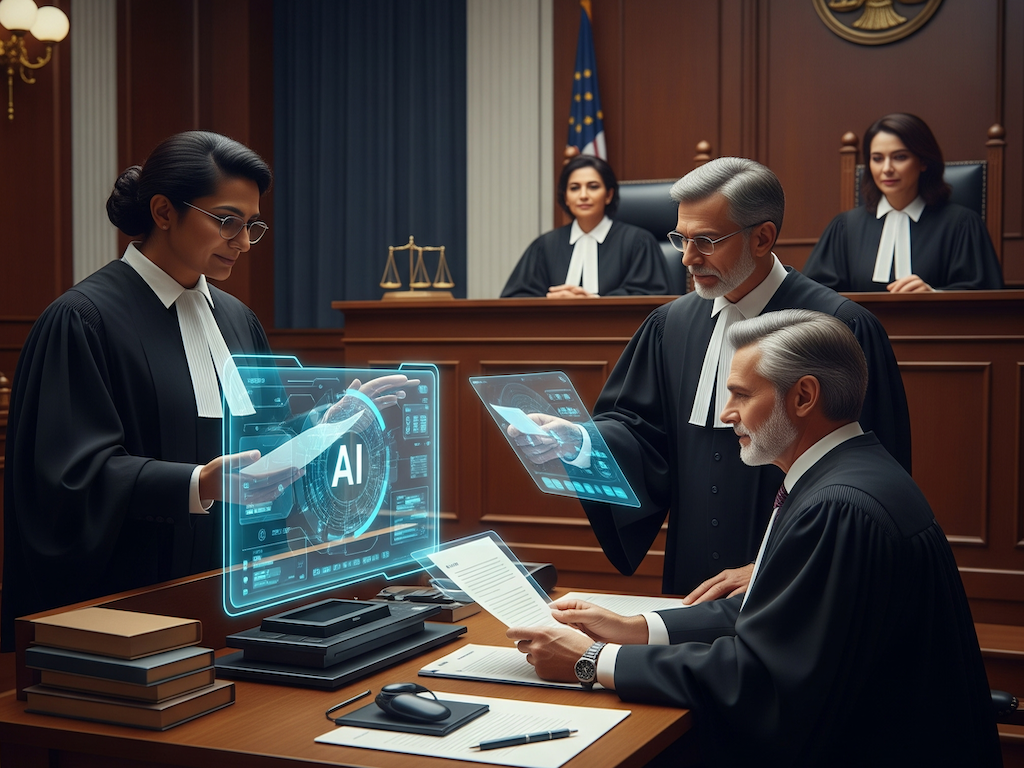
How AI Is Transforming the Legal System: A New Era of Efficiency and Accessibility
Artificial Intelligence (AI) is steadily reshaping the legal landscape. Long viewed as one of the more resistant sectors to automation, the legal field is now benefiting from AI’s growing ability to process information, identify patterns, and assist in decision-making. From helping lawyers conduct faster research to enabling judges to process cases more efficiently, AI has the potential to reduce the cost of justice, ease case backlogs, and expand access to legal services.
Smarter Legal Research and Analysis
One of the most immediate and impactful uses of AI in law is in legal research. Traditionally, attorneys spend hours combing through case law, statutes, and legal commentary to build arguments. Today, AI-powered platforms like Lexis+ AI, Westlaw Precision, and Casetext’s CoCounsel can process massive volumes of legal data in seconds. These tools use natural language processing (NLP) to understand context, retrieve relevant documents, and even summarize key findings. This not only reduces research time but helps identify arguments or precedents that a human might miss, improving both the quality and speed of legal preparation.
Helping Judges Work More Efficiently
While AI is not replacing judges, it is beginning to play a more active role in judicial decision-making—particularly in minor civil cases. For instance, Estonia has piloted an AI-based system to assist in resolving small claims under €7,000. The system analyzes the facts and applicable law to propose a ruling, which is then reviewed by a human judge. This approach can significantly reduce the time needed to reach a decision in routine matters like contract disputes or unpaid debts.
AI doesn’t just help with small claims—it’s becoming a vital assistant for judges dealing with high caseloads and complex litigation. By summarizing long legal briefs, identifying relevant precedents, and even flagging inconsistencies or contradictions in legal arguments, AI can help judges focus on the most important aspects of a case. In countries like the United States and the United Kingdom, experimental tools are already being used in trial and appellate courts to support judicial clerks and streamline judgment drafting.
Judges benefit not just from efficiency, but from clarity. AI systems can offer reasoning for their recommendations, giving judges a clear framework to either adopt or critique. This reduces the burden of low-complexity decision-making and preserves human judgment for areas where nuance and empathy are essential.
Faster and More Accurate Document Preparation
Legal paperwork is another area ripe for improvement. Drafting contracts, settlement agreements, wills, and court filings can be labor-intensive and error-prone. AI tools like Harvey AI, DoNotPay, and LawGeex can now generate initial drafts, spot inconsistencies, and check compliance with legal standards. In corporate law, AI is increasingly used to review contracts during due diligence or M\&A processes—freeing lawyers to focus on strategic decision-making.
By automating these repetitive tasks, legal professionals can reduce errors and work more efficiently, while clients benefit from faster turnaround and lower costs.
Expanding Access to Legal Help
One of the most promising applications of AI is in increasing access to justice for underserved populations. Many people facing eviction, workplace disputes, or family law issues can't afford a lawyer. AI-powered legal assistants and chatbots can help individuals understand their rights, fill out legal forms, or prepare for court hearings. Tools like Upsolve in the U.S. help people file for bankruptcy without legal representation, and chatbots like DoNotPay assist with disputing parking tickets, subscription cancellations, and consumer complaints.
While these tools are not a replacement for a lawyer, they can provide a much-needed entry point for people navigating the legal system on their own.
Supporting Public Defenders Under Pressure
Public defenders often carry excessive caseloads, limiting the time they can dedicate to each client. AI tools can help by streamlining discovery, identifying key pieces of evidence, and organizing case materials. By reducing administrative and research burdens, public defenders can spend more time on strategy, client interaction, and court preparation. This could directly improve the quality of defense for low-income defendants and contribute to a fairer system overall.
Reducing Delays and Court Backlogs
Court delays are a chronic problem in many jurisdictions. AI can help streamline scheduling, analyze dockets to prioritize urgent cases, and manage workflow across the judiciary. Some courts are beginning to use AI for predictive case management—estimating how long cases will take and allocating resources accordingly.
In the long term, the hope is that AI can help shrink court backlogs and shorten the time it takes to resolve disputes, improving public trust in the legal system’s responsiveness.
The Need for Oversight and Ethical Safeguards
Despite the progress, concerns about bias, transparency, and accountability must be taken seriously. AI systems learn from historical data, which may reflect systemic biases. If not carefully monitored, they could reinforce unfair outcomes rather than correct them.
That’s why human oversight is critical. Judges must retain the authority to question or override AI-generated recommendations. Legal professionals need to understand how these systems work and ensure they are used ethically and responsibly.
A Legal System That Works for Everyone
AI is not a silver bullet—but it is a powerful tool. If implemented wisely, it can help the legal system become faster, more accurate, and more inclusive. It can ease the burdens on legal professionals while empowering individuals to navigate the law more effectively. The future of law may not be fully automated, but it will almost certainly be AI-augmented—and that’s a step toward a more just and efficient society.